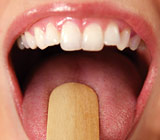 Bad breath, medically known as halitosis (“halitus” – breath; “osis” – disorder) is an unpleasant condition that can negatively impact your personal and business relationships. It’s more than just embarrassing! In fact, one recent survey found that three out of five people would rather work with someone who talks too loudly than with someone who has bad breath! Gum, mints and mouth rinses can temporarily remedy the situation, but not cure it permanently. So how much do you know about the underlying causes of bad breath?
Bad breath, medically known as halitosis (“halitus” – breath; “osis” – disorder) is an unpleasant condition that can negatively impact your personal and business relationships. It’s more than just embarrassing! In fact, one recent survey found that three out of five people would rather work with someone who talks too loudly than with someone who has bad breath! Gum, mints and mouth rinses can temporarily remedy the situation, but not cure it permanently. So how much do you know about the underlying causes of bad breath?
The following true/false quiz will help you discover, while learning more about bad breath.
Questions
- The most common orally related sites associated with bad breath are the tongue and gums.
- Systemic (general body) medical conditions can’t cause bad breath.
- Bad breath is always worse in the morning.
- Effective treatment depends on the underlying cause of the disease.
- Dentists can do very little to diagnose the cause of bad breath.
Answers
- True. The back of the tongue and diseased gums can become repositories for bacteria. In the case of the tongue they are from left over food deposits and even post-nasal drip. Bad breath that emanates from the tongue has a “rotten egg” odor caused by volatile sulfur compounds (VSCs).
- False. Medical conditions can cause bad breath including lung infections, liver disease, diabetes, kidney infections and cancer.
- True. Saliva flow decreases during the night making the mouth feel dry, and giving you that typical “morning breath” taste and odor upon wakening.
- True. As with any medical condition, uncovering the origin will dictate appropriate treatment. For example, tongue scraping or brushing can help eliminate odor that originate from the tongue. If the cause is disease related, the disease will need to be treated to control associated bad breath.
- False. There are several things dentists can do starting with a thorough medical history and oral examination. For example, decayed or abscessed teeth, diseased gums, coated tongue or infected tonsils are all common oral causes. We can also conduct breath tests to determine if the odor is emanating from the mouth or lungs, and test to determine the level of VSCs in the mouth.
Learn More
Worried about bad breath? Are you ready to trade your breath mints for a more permanent solution? Call our office today to schedule an oral examination. For more information about the causes of bad breath, read the Dear Doctor magazine article “Bad Breath: More Than Just Embarrassing.”



